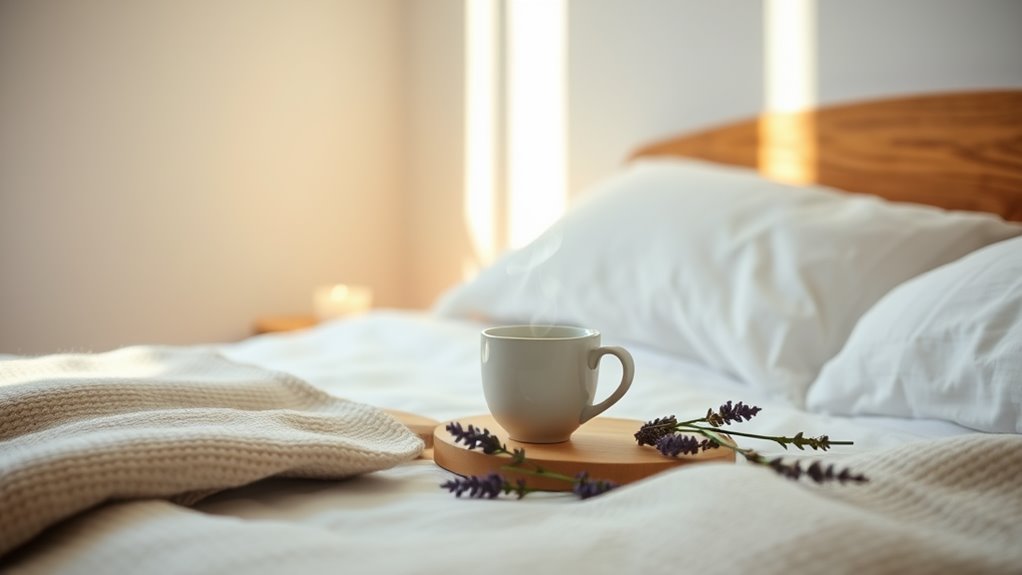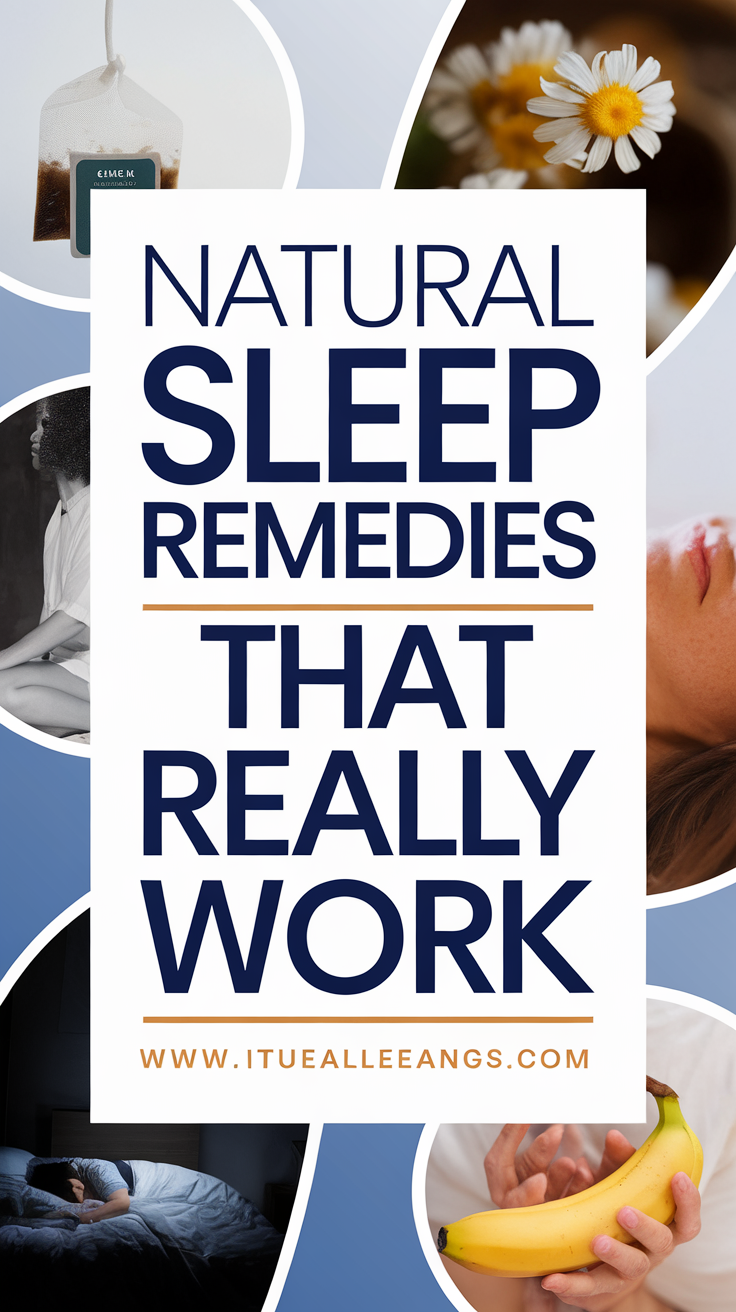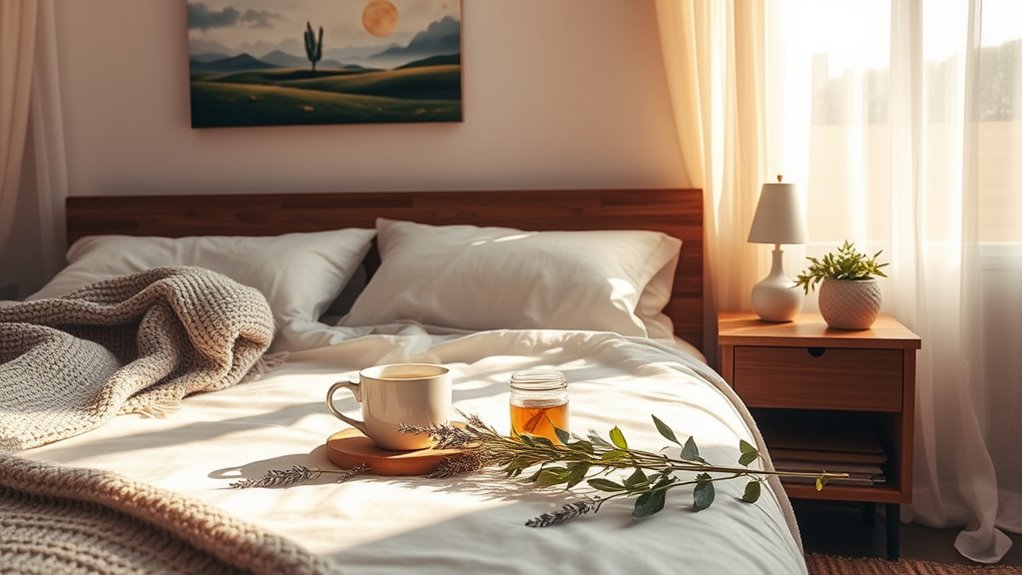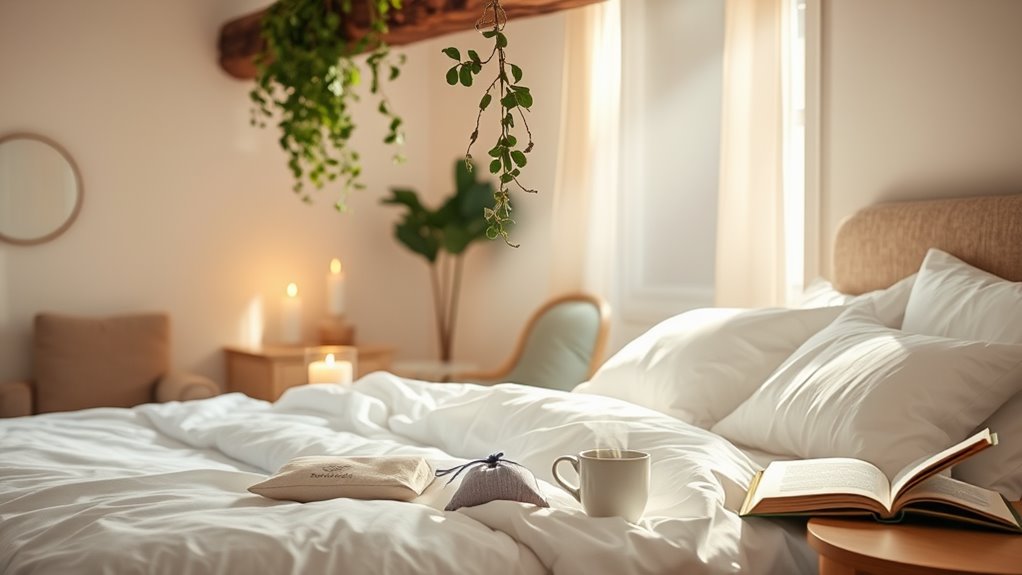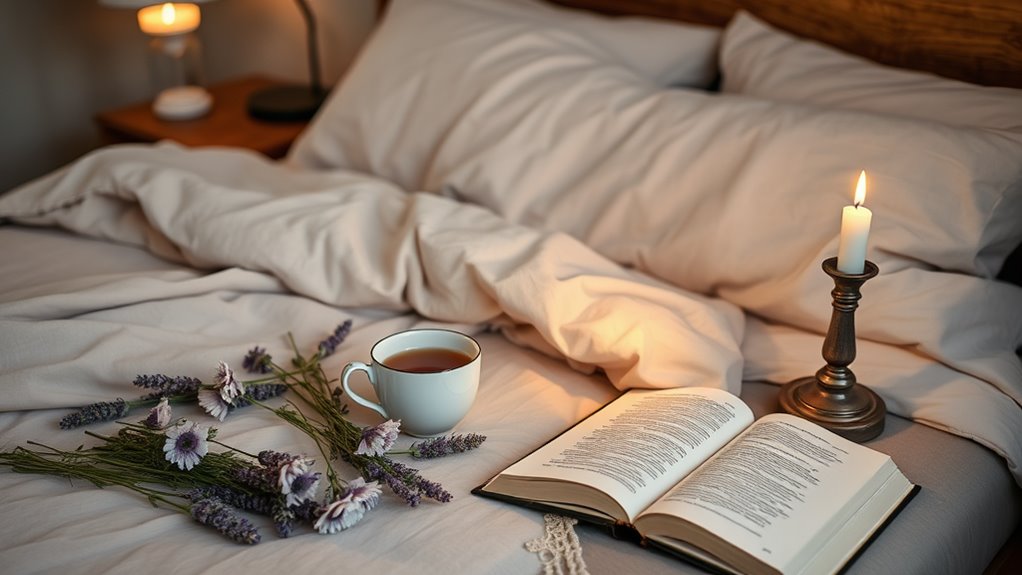Natural Remedies for a Better Night’s Sleep
Natural remedies can help you achieve a better night’s sleep. Start your evening with calming herbal teas like chamomile or valerian root, which promote relaxation. Include tryptophan-rich foods—think turkey, nuts, and bananas—in your dinner to support serotonin production. Practice relaxation techniques, like deep breathing or gentle yoga, to unwind before bed. Enhance your sleep environment by keeping your bedroom cool, dark, and clutter-free. Consider using essential oils like lavender for their calming effects. By incorporating these strategies, you can improve your sleep quality considerably—there’s so much more to explore for better rest ahead.
Key Takeaways
- Drink herbal teas like chamomile or valerian root before bed to promote relaxation and enhance sleep quality.
- Incorporate tryptophan-rich foods such as turkey, nuts, and bananas into your evening meals for better sleep cycles.
- Establish a consistent bedtime routine to signal your body to wind down and improve sleep patterns.
- Optimize your sleep environment by keeping the room cool, dark, and clutter-free to create a calming atmosphere.
- Use essential oils like lavender or chamomile in aromatherapy to relax the mind and promote restful sleep.
Herbal Teas for Sleep
When it comes to finding a good night’s sleep, many people turn to herbal teas as a natural remedy. Two of the most popular choices are chamomile and valerian root.
Chamomile benefits are well-documented; this gentle flower contains antioxidants that help reduce anxiety and promote relaxation. Drinking chamomile tea before bedtime can signal your brain that it’s time to wind down, making it easier to drift off into a restful slumber.
Valerian root is another powerful ally in your quest for better sleep. It’s been used for centuries to treat insomnia and anxiety. Valerian root works by increasing levels of gamma-aminobutyric acid (GABA) in the brain, a neurotransmitter that helps calm the nervous system.
Many people find that sipping valerian tea an hour before bed helps them fall asleep faster and enjoy a deeper sleep.
Combining these two herbal teas can enhance your sleep routine even further. By incorporating chamomile and valerian root into your evening ritual, you might just discover the soothing effects that nature has to offer, leading to a more restorative night’s sleep.
Give them a try and see how they work for you!
Relaxation Techniques
Numerous relaxation techniques can help you unwind and prepare for sleep. One effective method is deep breathing. By focusing on your breath, you can calm your mind and reduce anxiety.
Try inhaling deeply through your nose for a count of four, holding for four, and exhaling through your mouth for another four. Repeat this cycle several times, allowing your body to relax with each breath.
Another technique is progressive relaxation. This involves tensing and then relaxing different muscle groups in your body, starting from your toes and moving up to your head.
As you tense each muscle group for a few seconds, focus on the sensations, then release the tension and notice how your body feels lighter. This not only helps ease physical tension but also promotes mental relaxation.
Incorporating these techniques into your nightly routine can signal to your body that it’s time to wind down.
Sleep-Inducing Foods
When it comes to improving your sleep, certain foods can make a significant difference.
Incorporating tryptophan-rich foods, sipping herbal teas, and consuming magnesium sources can help your body relax and prepare for rest.
Let’s explore how these sleep-inducing foods can enhance your nighttime routine.
Tryptophan-Rich Foods
Tryptophan-rich foods can play a significant role in promoting better sleep. This essential amino acid is a precursor to serotonin, a neurotransmitter that helps regulate mood and sleep cycles. By incorporating tryptophan-rich foods into your diet, you can support serotonin synthesis, leading to improved sleep quality and overall well-being.
Here are some excellent sources of tryptophan to take into account:
-
Turkey: Known for its sleep-inducing properties, turkey benefits include high tryptophan content, making it a perfect dinner option.
-
Nuts: Almonds and walnuts not only provide healthy fats but also boost your tryptophan intake.
-
Dairy products: Milk and yogurt are great for promoting relaxation and sleepiness, thanks to their tryptophan levels.
-
Bananas: This fruit not only offers potassium but also helps in the conversion of tryptophan to serotonin.
Incorporating these foods into your meals can aid in better sleep. By making conscious dietary choices, you’re taking a proactive step towards a more restful night.
Herbal Tea Options
A warm cup of herbal tea can be a soothing addition to your bedtime routine, helping to signal your body that it’s time to unwind. Among the best options are chamomile and valerian root teas, both renowned for their sleep-inducing properties.
Chamomile benefits include its ability to promote relaxation and reduce anxiety, thanks to its antioxidant apigenin. This compound binds to specific receptors in your brain, aiding in the onset of sleep. Sipping chamomile tea about 30 minutes before bedtime can enhance your chances of falling asleep faster and enjoying a more restful night.
Valerian root is another excellent choice. It’s been used for centuries as a natural remedy for insomnia. Studies suggest that valerian root may improve sleep quality without the grogginess associated with some sleep medications.
By drinking valerian tea, you may find that you drift off more easily and wake up feeling refreshed.
Incorporating these herbal teas into your nightly routine can create a calming ritual that prepares both your body and mind for sleep. So, why not brew a cup tonight and experience the restful benefits for yourself?
Magnesium Sources
Many people overlook the importance of magnesium in their diet, yet this essential mineral plays an essential role in promoting better sleep.
Studies have shown that magnesium helps regulate neurotransmitters, which send signals to your brain and nervous system, ultimately aiding in relaxation and sleep quality.
If you’re looking to boost your magnesium intake, consider incorporating these sleep-inducing foods into your meals:
- Spinach: This leafy green is packed with magnesium and can easily be added to salads or smoothies.
- Almonds: A handful of almonds not only satisfies your hunger but also provides a good dose of magnesium.
- Black beans: Rich in fiber and magnesium, they make a great addition to various dishes.
- Dark chocolate: Indulging in dark chocolate can give you a magnesium boost while satisfying your sweet tooth.
If you find it challenging to get enough magnesium through food, magnesium supplements can be a great alternative.
These supplements can help you achieve the magnesium benefits you need for a restful night.
Prioritizing magnesium in your diet can lead to improved sleep quality and overall well-being.
Essential Oils
When it comes to enhancing your sleep, essential oils can really make a difference. The aromatherapy benefits of essential oils are well-documented, providing you with a natural way to promote relaxation and improve your sleep quality.
Popular essential oils like lavender, chamomile, and bergamot are known for their calming properties, helping to ease anxiety and stress before bedtime. You can create your own essential blends by mixing a few drops of these oils in a diffuser or applying them topically with a carrier oil.
For instance, a blend of lavender and chamomile can create a soothing atmosphere in your bedroom, making it easier for you to unwind after a long day. Research shows that inhaling these scents can lower heart rates and reduce blood pressure, leading to a more restful night.
Incorporating essential oils into your nightly routine is simple and effective. You might try adding a few drops to your pillow or making an aromatherapy spray to mist your sheets.
With consistent use, you’ll likely notice a positive impact on your sleep patterns, helping you wake up refreshed and ready for the day ahead.
Lifestyle Changes
Making simple lifestyle changes can greatly improve your sleep quality. One of the most effective strategies is to establish a consistent bedtime routine. By training your body to wind down at the same time each night, you signal to your brain that it’s time to relax.
You should also be mindful of your screen time before bed. The blue light emitted by phones, tablets, and computers can interfere with melatonin production, making it harder for you to fall asleep.
Consider these tips to enhance your sleep:
- Limit screen exposure: Aim to turn off devices at least an hour before bed.
- Create a wind-down ritual****: Engage in calming activities like reading, meditating, or taking a warm bath.
- Stay active during the day: Regular exercise can promote deeper sleep, but try to avoid intense workouts close to bedtime.
- Mind your diet: Avoid heavy meals, caffeine, and alcohol in the evening, as they can disrupt your sleep cycle.
Sleep Environment Optimization
Creating a sleep-friendly environment is essential for achieving restful nights. A well-optimized sleep space not only enhances your comfort but also supports good sleep hygiene.
Start by ensuring your bedroom is a sanctuary for sleep. Keep the temperature cool, ideally between 60 to 67 degrees Fahrenheit, as cooler environments promote deeper sleep.
Next, pay attention to bedroom lighting. Exposure to bright lights, especially blue light from screens, can disrupt your circadian rhythm. Consider using blackout curtains or an eye mask to block out unwanted light and create a darker space for sleep. Dim the lights an hour before bedtime to signal to your body that it’s time to wind down.
Additionally, declutter your bedroom to eliminate distractions and maintain a calm atmosphere. Use soothing colors and minimal decor to promote relaxation.
If you’re sensitive to noise, consider white noise machines or earplugs to mask disruptive sounds.
Frequently Asked Questions
Can Natural Remedies Replace Prescription Sleep Medications?
Isn’t it ironic how natural alternatives often seem overshadowed by prescription sleep medications? While sleep hygiene plays an essential role, you can explore these remedies, but they aren’t guaranteed to replace traditional treatments effectively.
Are There Any Side Effects of Using Herbal Teas for Sleep?
When using herbal teas for sleep, you should be aware of potential interactions with medications. Some herbal tea ingredients can cause side effects like drowsiness or upset stomach, so consult your doctor before trying new blends.
How Long Before Bed Should I Use Essential Oils?
You should use essential oils about 30 minutes before bed to enhance your sleep routine. Experiment with different essential oil types, like lavender or chamomile, to find what calms you best and promotes restful sleep.
Can I Combine Multiple Sleep Remedies Safely?
Sure, you can mix sleep remedies like herbal combinations, but don’t go wild! Following safety guidelines is essential, or you might just end up wide awake, contemplating the universe at 3 AM instead.
Do Natural Remedies Work for Everyone?
Natural remedies don’t work for everyone. Individual experiences vary widely, and effectiveness can change based on personal factors. It’s important to experiment and find what suits you best for best results and restful nights.

